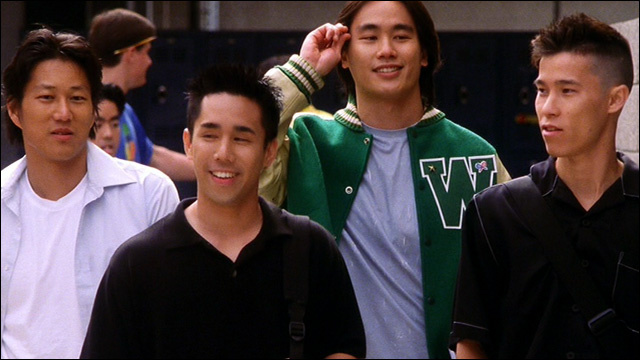BETTER LUCK TOMORROW

Hello, this week's feature fiction film is Justin Lin's BETTER LUCK TOMORROW (released in 2003). Please read and consider the Discussion Questions, which we will discuss in class on Wednesday. BETTER LUCK TOMORROW is significant in its focus on Asian American characters and production ethos, the response to the film ("shock", "confusion" ~ remember FORBIDDEN CITY, USA?), Justin Lin's fortitude and perseverance, the act of independent filmmaking ~ as adjacent or in reference or counter to the mainstream, and BLT's historical placement: 20 years after THE JOY LUCK CLUB and 15 years before CRAZY RICH ASIANS. Plus ~ Han! BETTER LUCK TOMORROW is a kind of prequel to the FAST & FURIOUS multi-million dollar franchise. BLT's budget was $250,000 ~ the last portion was given to Justin by MC Hammer, which enabled him to finish the film.





Here are some articles for you to read:
BETTER LUCK TOMORROW
To understand the film better, please read famed film critic, Roger Ebert’s essay, about the “controversial” screening of BETTER LUCK TOMORROW at the Sundance Film Festival, which is captured in the short film, BLT: GENESIS (directed by Evan J. Leong). You can also read his review of BETTER LUCK TOMORROW. Please know that (like Pauline Kael and Andrew Sarris before him and perhaps Elvis Mitchell after him ~ google them!), Roger Ebert has been one of the most influential people in film culture. He was not only a journalist as well as co-host of a television series which brought film criticism to a mass audience, he became an advocate for independent filmmaking by people of color in particular. He was an incisive writer and a thoughtful humanitarian. Here are some excerpts:
Amoral, yes. Shockingly. He seems to exist in a world of achievement and ambition that operates entirely apart from moral values. Another audience member drew a parallel with Enron executives who apparently concealed the fact that their numbers didn't add up. Justin Lin said he senses a moral disconnect in some of today's teenagers and wanted to make a movie about it. His cast was all Asian American because--well, why not?
https://www.rogerebert.com/reviews/better-luck-tomorrow-2003 Links to an external site.
"Better Luck Tomorrow" is a coming-of-age film for Asian Americans in American cinema. Like African-American films that take race for granted and get on with the characters and the story, Lin is making a movie where race is not the point but simply the given. After Ben joins the basketball team, a writer for the high school paper suggests he is the "token Asian" bench-warmer, and when students form a cheering section for him, he quits the team in disgust. He is not a token anything (and privately knows he has beaten the NBA record for free throws).
The story is insidious in the way it moves stealthily into darker waters while maintaining the surface of a high school comedy. There are jokes and the usual romantic breakthroughs and reversals, and the progress of their criminal career seems unplanned and offhand, until it turns dangerous. I will not reveal the names of the key characters in the climactic scene, but note carefully what happens in terms of the story; perhaps the film is revealing that a bland exterior can hide seething resentment.
Justin Lin, who directed, co-wrote and co-produced, here reveals himself as a skilled and sure director, a rising star. His film looks as glossy and expensive as a megamillion studio production, and the fact that its budget was limited means that his cinematographer, Patrice Lucien Cochet; his art director, Yoo Jung Han, and the other members of his crew were very able and resourceful. It's one thing to get an expensive look with money and another thing to get it with talent.
Lin keeps a sure hand on tricky material; he has obvious confidence about where he wants to go and how he wants to get there. His film is uncompromising and doesn't chicken out with a U-turn ending.
…..
I want to know what you think about the ending!
About Justin Lin:
Meet Justin Lin, the Most Important Blockbuster Director You've Never Heard Of
And here is a recent interview with actor Sung Kang, who plays Han, that you can listen to:
" ... his role in the 2002 groundbreaking Sundance pic Better Luck Tomorrow directed by Justin Lin. The ahead-of-its-time drama was bolstering Asian representation Links to an external site. in film before Hollywood realized diverse storytelling was something people wanted. And let’s not forget — Better Luck Tomorrow is unofficially part of the Fast & Furious universe."


~Professor Kim